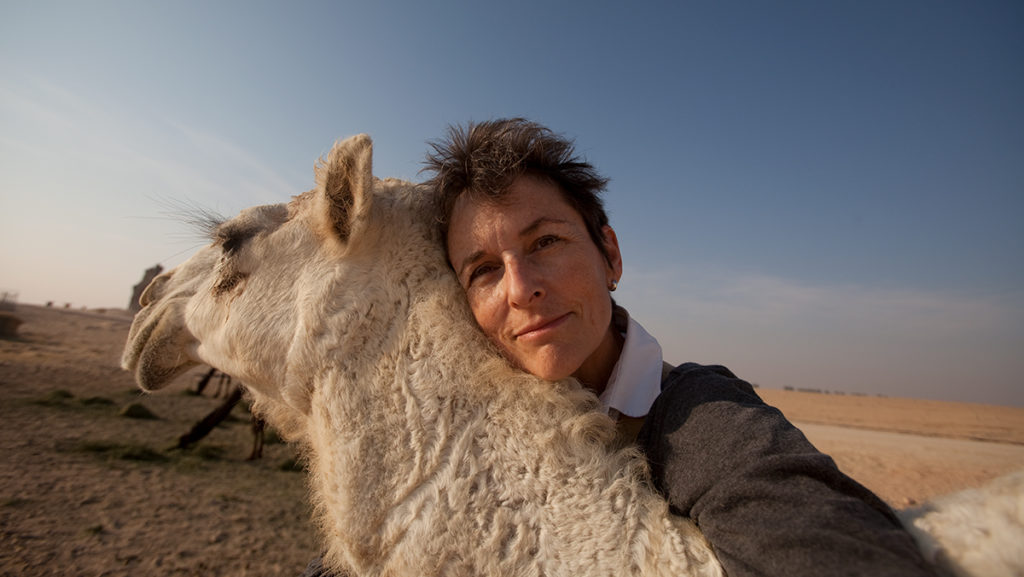Janice Levy, professor in the Department of Media Arts, Sciences and Studies, recently published an essay about her experience overseeing a service-learning program that taught children with disabilities the art of photography.
During her 2010–11 sabbatical, Levy taught photography at Princess Nora University, a large government-run university in Saudi Arabia. She said she learned that students were interested in doing more service-learning projects and decided to start one while she was there. She brought her photography students at PNU to a school for children with disabilities, and there they taught the children how to take photographs.
The Institute for Photographic Empowerment published her paper, titled “What I see, Who I am: Saudi Women Enrolled in University Photo Course Teach Disabled Children to Communicate with Cameras,” in October, and the paper went on to be accepted into the Arts and Society Research Network conference, which will be held in Paris in June 2017.
Contributing Writer Erin Conway spoke to Levy about how her work in Saudi Arabia, her paper and the upcoming conference.
[gss ids=’14109,14113,14112,14111,14110,14108′ carousel=’fx=carousel’ options=’loop=2&pause-on-hover=true&timeout=2000′]
This interview has been edited for length and clarity.
Erin Conway: What made you want to write this paper about your experience?
Janice Levy: While I was over there, I looked up a Washington Post photographer from the ’80s named Jim Hubbard. Hubbard would go into impoverished areas, and when he did, he realized whenever kids were around, they would want to take pictures with his camera. He started a program called Shooting Back. He let these kids use the cameras and noticed the pictures they took were really revealing about their lives and their homes and the things that were important to them.
EC: How did you come up with the title for this paper?
JL: I came up with it myself. It’s fitting because it says, “If I can show you what I see, it will tell you who I am.” It says, “If I can’t talk or move or if I don’t look like you, I will show you. I am so much more than just what you see.”
EC: What were some of the challenges teaching at PNU?
JL: There was a lot to overcome with this photography project. There was a lot to overcome in just terms of teaching my students at the university. In their interpretation of Islam, they are not allowed to make any likeness of anything living. In other words, they cannot draw the human figure or anything living. I learned about this when I gave my first portrait assignment and one of the young women raised her hand and told me they couldn’t do the assignment because it’s haram, or against Islam. Instead, they took pictures of things that represented the human form or just objects and scenery. Another challenge was the language barrier. They didn’t speak much English, and I didn’t speak much Arabic. Being disabled is also very taboo in Saudi culture, so getting the PNU students to even want to come to the Disabled Association took a while.
EC: What else do you have to do to prepare for the conference in June?
JC: I’ll have to write an article. I plan on expanding on the paper I have written. I have asked the PNU students to write about their experience, which they have, but it needs to be translated. I will be able to include some of their quotes in the article that will be published in the academic journal the conference puts out. I will also give a presentation during the two-day conference, so I’ll put together a slideshow and present the work the students did and discuss how it was done.
EC: Why is this conference important for you to go to?
JL: Sometimes, when I start to think about what a mess this world is, and I ask, “What have I done to help?” I think about this project, and I think about this upcoming conference, talking about this project to people who might take this model to their country and try it and make people think about the ways in which they contribute. Maybe they will make a little bit of a difference. It’s like a double blessing because I get to pass this lesson on.
EC: What do you hope that your readers take away from the piece you will have published in the academic journal?
JL: I want people to take away the lesson that it is possible to teach humility and understanding. I think that those are a part of the equation for eliminating hatred and xenophobia in this world. That’s what I want. I want my work to show that if you can put people together in a way that eliminates those irrational fears, it can create something productive. Like I said in my proposal, I want my work to be a lesson in humility, humanity and hope.








